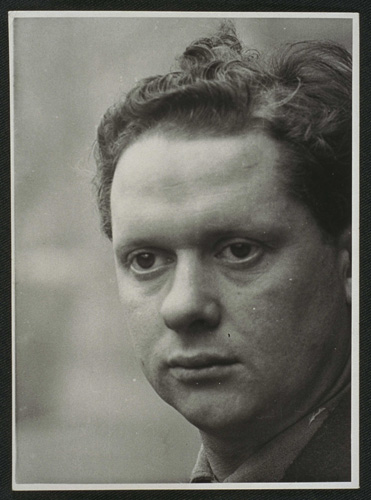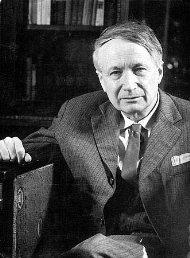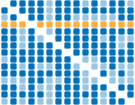Thomas, Dylan: Ha tüzes dróttól szebben is fütyül a kalitkamadár (Because the pleasure-bird whistles after in Hungarian)
|
Because the pleasure-bird whistles after (English)Because the pleasure-bird whistles after the hot wires, Shall the blind horse sing sweeter? Convenient bird and beast lie lodged to suffer The supper and knives of a mood. In the sniffed and poured snow on the tip of the tongue of the year That clouts the spittle like bubbles with broken rooms, An enamoured man alone by the twigs of his eyes, two fires, Camped in the drug-white shower of nerves and food, Savours the lick of the times through a deadly wood of hair In a wind that plucked a goose, Nor ever, as the wild tongue breaks its tombs, Rounds to look at the red, wagged root. Because there stands, one story out of the bum city, That frozen wife whose juices drift like a fixed sea Secretly in statuary, Shall I, struck on the hot and rocking street, Not spin to stare at an old year Toppling and burning in the muddle of towers and galleries Like the mauled pictures of boys? The salt person and blasted place I furnish with the meat of a fable; If the dead starve, their stomachs turn to tumble An upright man in the antipodes Or spray-based and rock-chested sea: Over the past table I repeat this present grace.
|
Ha tüzes dróttól szebben is fütyül a kalitkamadár (Hungarian)Ha tüzes dróttól szebben is fütyül a kalitkamadár, a vak ló mért dalolna édesebben? Csak alkalmas vad és madár kerül terítékre, hogy fölszeleteljék egy hangulat vacsoráján. A megszimatolt hóesésben, az esztendő nyelve hegyén, mely szertepattanó szobák nyálbuborékait köpi, egy szerelmes férfi egymagában, szemének kettős rőzsetüze mellett, az idegek és a manna méregfehér zivatarában táborozva, érzi az idők nyaldosását halálos hajerdőn keresztül, libatollfosztó szélviharban, és hátra sem tekint, míg a szilaj nyelv sírjaiból kitör, a lángvörös, ingó gyökérre. Ha ott is áll, mint emelet az ócska városon kívül, a megkövült feleség, kinek nedvei, dermedt tengerárként, csak titkon áramlanak a szoborban, én, ki a forró és himbálódzó utcára vetődtem, mért ne fordulnék vissza, megbámulni egy régi évet, amint imbolyog és elég tornyok és erkélyek zűrzavarában, mint kisfiúk odakent mázolmányai? A sótartalmú nőszemélyt s a fölperzselt helyet jóltartom egy mese húsételével; ha éheznek a holtak, bendőjük könnyen fölboríthat egyenes embert is az ellentétes féltekén vagy a permet-talapzatú, szikla-mellkasú tengeren: a hajdani asztal fölött ismétlem e mostani áldást.
|





